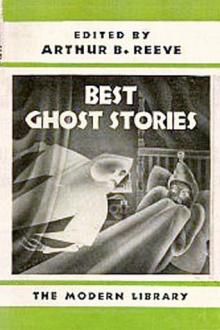In a Steamer Chair and Other Stories - Robert Barr (rm book recommendations .TXT) 📗

- Author: Robert Barr
Book online «In a Steamer Chair and Other Stories - Robert Barr (rm book recommendations .TXT) 📗». Author Robert Barr
"Stay where you are," whispered Storm to me, pinching my knee with his hand so hard that I almost cried out.
Then it came to the gambler's turn to deal again. All the time he deftly shuffled the cards he watched the players with that furtive glance of his from out his half-shut eyes.
Storm's hand was a remarkable one, after he had drawn two cards, but I did not know whether it had any special value or not. The other players drew three cards each, and the gambler took one.
"How much money have you got?" whispered Storm to me.
"I don't know," I said, "perhaps a hundred pounds."
"Be prepared to lend me every penny of it," he whispered.
I said nothing; but I never knew the president of a society for the suppression of gambling to be in such a predicament.
Storm bet a sovereign. The player to his left threw down his hand. The gambler pushed out two sovereigns. The other player went out.
Storm said, "I see your bet, and raise you another sovereign." The gambler, without saying a word, shoved forward some more gold.
"Get your money ready," whispered Storm to I did not quite like his tone, but I made allowance for the excitement under which he was evidently labouring.
He threw on a five-pound note. The gambler put down another five-pound note, and then, as if it were the slightest thing possible, put a ten-pound note on top of that, which made the side players gasp. Storm had won sufficient to cover the bet and raise it. After that I had to feed in to him five-pound notes, keeping count of their number on my fingers as I did so. The first to begin to hesitate about putting money forward was the gambler. He shot a glance now and again from under his eyebrows at the young man opposite. Finally, when my last five-pound note had been thrown on the pile, the gambler spoke for the first time.
"I call you," he said.
"Put down another five-pound note," cried the young man.
"I have called you," said the gambler.
Henry Storm half rose from his seat in his excitement. "Put down another five-pound note, if you dare."
"That isn't poker," said the gambler. "I have called you. What have you got?"
"Put down another five-pound note, and I'll put a ten-pound note on top of it."
"I say that isn't poker. You have been called. What have you got?"
"I'll bet you twenty pounds against your five-pound note, if you dare put it down."
By this time Storm was standing up, quivering with excitement, his cards tightly clenched in his hand. The gambler sat opposite him calm and imperturbable.
"What have you got?" said Storm.
"I called you," said the gambler, "show your hand."
"Yes; but when I called you, you asked me what I had, and I told you. What have _you_ got?"
"I am not afraid to show my hand," said the gambler, and he put down on the table four aces.
"There's the king of hearts," said Storm, putting it down on the table. "There's the queen of hearts, there's the knave of hearts, there's the ten of hearts. Now," he cried, waving his other card in the air, "can you tell me what this card is?"
"I am sure I don't know," answered the gambler, quietly, "probably the nine of hearts."
"It _is_ the nine of hearts," shouted Storm, placing it down beside the others.
The gambler quietly picked up the cards, and handed them to the man who was to deal. Storm's hands were trembling with excitement as he pulled the pile of bank notes and gold towards him. He counted out what I had given him, and passed it to me under the table. The rest he thrust into his pocket.
"Come," I said, "it is time to go. Don't strain your luck."
"Another five pounds," he whispered; "sit where you are."
"Nonsense," I said, "another five pounds will certainly mean that you lose, everything you have won. Come away, I want to talk with you."
"Another five pounds, I have sworn it."
"Very well, I shall not stay here any longer."
"No, no," he cried eagerly; "sit where you are, sit where you are."
There was a grim thin smile on the lips of the gambler as this whispered conversation took place.
When the next hand was dealt around and Storm looked at his cards, he gave another gasp of delight. I thought that a poker player should not be so free with his emotions; but of course I said nothing. When it came his time to bet, he planked down a five-pound note on the table. The other two, as was usual, put down their cards. They were evidently very timorous players. The gambler hesitated for a second, then he put a ten-pound note on Storm's five-pounds. Storm at once saw him, and raised him ten. The gambler hesitated longer this time, but at last he said, "I shall not bet. What have you got?"
"Do you call me?" asked Storm. "Put up your money if you do."
"No, I do not call you."
Storm laughed and threw his cards face up on the table. "I have nothing," he said, "I have bluffed you for once."
"It is very often done," answered the gambler, quietly, as Storm drew in his pile of money, stuffing it again in his coat pocket. "Your deal, Storm."
"No, sir," said the young man, rising up; "I'll never touch a poker hand again. I have got my own money back and five or ten pounds over. I know when I've had enough."
Although it was Storm's deal, the gambler had the pack of cards in his hand idly shuffling them to and fro.
"I have often heard," he said slowly without raising his eyes, "that when one fool sits down beside another fool at poker, the player has the luck of two fools----but I never believed it before."
THE MAN WHO WAS NOT ON THE PASSENGER LIST.
"The well-sworn Lie, franked to the world with all
The circumstance of proof,
Cringes abashed, and sneaks along the wall
At the first sight of Truth."
The _Gibrontus_ of the Hot Cross Bun Line was at one time the best ship of that justly celebrated fleet. All steamships have, of course, their turn at the head of the fleet until a better boat is built, but the _Gibrontus_ is even now a reasonably fast and popular boat. An accident happened on board the _Gibrontus_ some years ago which was of small importance to the general public, but of some moment to Richard Keeling--for it killed him. The poor man got only a line or two in the papers when the steamer arrived at New York, and then they spelled his name wrong. It had happened something like this: Keeling was wandering around very late at night, when he should have been in his bunk, and he stepped on a dark place that he thought was solid. As it happened, there was nothing between him and the bottom of the hold but space. They buried Keeling at sea, and the officers knew absolutely nothing about the matter when inquisitive passengers, hearing rumours, questioned them. This state of things very often exists both on sea and land, as far as officials are concerned. Mrs. Keeling, who had been left in England while her husband went to America to make his fortune, and tumbled down a hole instead, felt aggrieved at the company. The company said that Keeling had no business to be nosing around dark places on the deck at that time of night, and doubtless their contention was just. Mrs. Keeling, on the other hand, held that a steamer had no right to have such mantraps open at any time, night or day, without having them properly guarded, and in that she was also probably correct. The company was very sorry, of course, that the thing had occurred; but they refused to pay for Keeling unless compelled to do so by the law of the land, and there matters stood. No one can tell what the law of the land will do when it is put in motion, although many people thought that if Mrs. Keeling had brought a suit against the Hot Cross Bun Company she would have won it. But Mrs. Keeling was a poor woman, and you have to put a penny in the slot when you want the figures of justice to work, so the unfortunate creature signed something which the lawyer of the company had written out, and accepted the few pounds which Keeling had paid for Room 18 on the _Gibrontus_. It would seem that this ought to have settled the matter, for the lawyer told Mrs. Keeling he thought the company acted very generously in refunding the passage money; but it didn't settle the matter. Within a year from that time, the company voluntarily paid Mrs. Keeling L2100 for her husband. Now that the occurrence is called to your mind, you will perhaps remember the editorial one of the leading London dailies had on the extraordinary circumstance, in which it was very ably shown that the old saying about corporations having no souls to be condemned or bodies to be kicked did not apply in these days of commercial honour and integrity. It was a very touching editorial, and it caused tears to be shed on the Stock Exchange, the members having had no idea, before reading it, that they were so noble and generous.
How, then, was it that the Hot Cross Bun Company did this commendable act when their lawyer took such pains to clear them of all legal liability? The purser of the _Gibrontus_, who is now old and superannuated, could probably tell you if he liked.
When the negotiations with Mrs. Keeling had been brought to a satisfactory conclusion by the lawyer of the company, and when that gentleman was rubbing his hands over his easy victory, the good ship _Gibrontus_ was steaming out of the Mersey on her way to New York. The stewards in the grand saloon were busy getting things in order for dinner, when a wan and gaunt passenger spoke to one of them.
"Where have you placed me at table?" he asked.
"What name, sir?" asked the steward.
"Keeling."
The steward looked along the main tables, up one side and down the other, reading the cards, but nowhere did he find the name he was in search of. Then he looked at the small tables, but also without success.
"How do you spell it, sir?" he asked the patient passenger.
"K-double-e-l-i-n-g."
"Thank you, sir."
Then he looked up and down the four rows of names on the passenger list he held in his hand, but finally shook his head.
"I can't find your name on the passenger list," he said. "I'll speak to the purser, sir."
"I wish you would," replied the passenger in a listless way, as if he had not much interest in the matter. The passenger, whose name was not on the list, waited until





Comments (0)